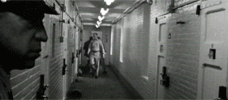Reviews
Frederick Wiseman
USA, 1972
Credits
Review by Rumsey Taylor
Posted on 07 June 2008
Source Zipporah Films DVD
Categories Frederick Wiseman
Frederick Wiseman’s Juvenile Court concerns the establishment of the title, a bureaucratic institution in Memphis, TN, which on a daily basis sees and tries a variety of teens (and younger) involved in anything from petty theft to armed robbery. The protocol is nothing unordinary: those accused are brought and detained until a proper corrective solution is pronounced (typically a foster home or “training” school), and often the crimes reach trial, each overseen by a benevolent judge. Although the proceedings are generally calm, all of this comes across as unusually dire—because these are all children.
Only a few trials (or portions thereof) are developed in the film, and each of the crimes stem, by some measure, from the parent or parents. A young girl, returning to court because of a probation violation, seldom goes to school or home, and a counselor instructs her mother that she may be influencing her child’s irresponsibility. The mother remains immaturely incredulous as she’s told this in an example of the serendipitous double meaning of the phrase “juvenile court.” One of the children, a 16-year-old boy, is accused of molesting one of the children he was invited to baby-sit, and although he consistently denies the accusation, the revelation of his own abuse, at the hand of his father, is integral in inference of his guilt.
In this particular instance, the boy is so vehemently convinced of his innocence that he suggests a polygraph test. I found this curious, even though the test doesn’t occur in the film (that is, if it was administered to begin with), because some of these children seem to want to be tried under the same protocol as an adult even if the results would be potentially and exponentially more severe. There’s another who’s so afraid of entering a guilty plea because it would necessitate that he attend training school; he weeps, begging his lawyer to go to trial as an adult, even if the minimum penalty is a 10-year sentence in a state penitentiary. These children have an undeveloped comprehension of state-issued punishment, and in turn the very nature of how guilt pertains to one’s actions, not one’s demeanor.
The solutions at Juvenile Court are usually made to be in the children’s “best interest,” and they’re advised to stay out of trouble. But this “trouble” isn’t clearly defined, not to the viewer and not to the accused. It’s evocative of the grey area that is adolescence; stealing a bit of money when your fifteen is “trouble”; doing the same thing once you’re eighteen is a punishable crime. I’m not sure there is an adequate solution more instrumental in these children’s development other than the very process of aging. It is the notion of a child’s dependency that fosters corrective solutions less severe than an adult’s, but this same notion, somewhat paradoxically, does not extend to the parent/guardian. Being that these children are tried on the basis of their limited responsibility, shouldn’t the parent recompense in the interest of more comprehensive corrective punishment?
These are my own queries, as Wiseman - in what will soon become a redundant declaration this month - abstains from any form of judicial query. The film is constructed not to excavate query, but rather to establish a sort of chronology in protocol, beginning with exterior shots of Juvenile Court and ending with a sentencing. The direction is characterized by a plainness, and in my viewing of Wiseman’s films I’ve been compelled to substitute for his determined lack of manipulation or argument. Juvenile Court has a utility as a microcosm of the very nature of state-issued punishment, be it given to a child or an adult; the crime, the solution, and the penalty isn’t fundamentally different for either party. The most differentiating factor here is age, even if the nature of guilt and need for solution is of little difference between a teen and an adult. Wiseman’s film examines this but refrains from contriving a solution, or at least to suggest one. Instead, it functions to examine, quite carefully, the source of a problem.
More Frederick Wiseman
-

Titicut Follies
1967 -

High School
1968 -

Law & Order
1969 -

Basic Training
1971 -

Juvenile Court
1972 -

Primate
1974 -

Welfare
1975 -

Meat
1976 -

Sinai Field Mission
1978 -

Manoeuvre
1979 -

Model
1980 -

The Store
1983 -

Blind
USA -

Adjustment & Work
1986 -

Missile
1987 -

Central Park
1989 -

Near Death
1989 -

Aspen
1991 -

Zoo
1993 -

High School II
1994 -

Ballet
1995 -

La Comédie-Française
1996 -

Public Housing
1997 -

Belfast, Maine
1999 -

Domestic Violence / Domestic Violence 2
2001 / 2002 -

The Last Letter
2002 -

State Legislature
2006
We don’t do comments anymore, but you may contact us here or find us on Twitter or Facebook.



